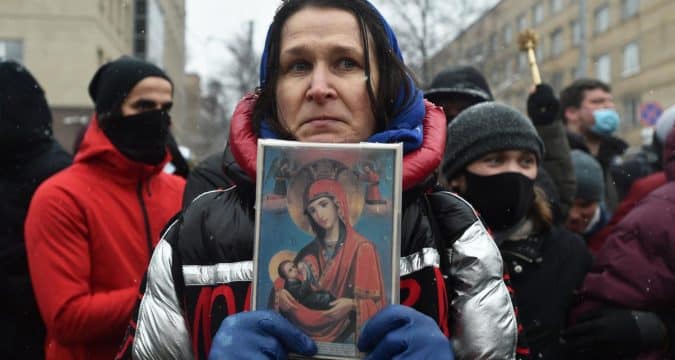
OXFORD (CNS): Jesuit Father Stephan Lipke, secretary-general of the Russian Bishops’ Conference defended the Church’s right to speak out during police repression, while an archbishop called for “substantial, concrete answers” to societal problems that are the subject of current massive protests.
“Young people have gone out in freezing temperatures and tried to express their convictions, and many have suffered in consequence—moral issues are involved here and our church shouldn’t stay silent,” Father Lipke said.
“Some warn this might endanger the life of our parishes. But what’s the good of parishes if they’re just centres of confusion and do nothing to shape people’s consciences?” he asked on February 10.
In ongoing protests against the treatment of opposition leader, Alexei Navalny, more than 11,000 people have been arrested, mostly in Moscow.
Father Lipke said that Masses have been disrupted by police road closures in Moscow and St. Petersburg, while several Catholics were among those beaten and deprived of food and water while in police detention.
“Some Catholics think it’s OK (that) Navalny is in prison, since they don’t agree with his opinions. But while I myself don’t agree with his opinions, this isn’t a reason to send him to jail,” said the priest, who directs Moscow’s St. Thomas Institute and previously ministered at Tomsk in Siberia.
“Young people have gone out in freezing temperatures and tried to express their convictions, and many have suffered in consequence—moral issues are involved here and our church shouldn’t stay silent”
The United States and other western governments criticised the February 2 jailing of Navalny, who was arrested on January17 upon his return from Germany where he spent five months in the hospital after a near-fatal nerve agent attack. The European Union warned of further sanctions against Russia, after diplomats from Germany, Poland and Sweden were expelled.
Meanwhile, Archbishop Paolo Pezzi, who heads the Mother of God Archdiocese in Moscow, blamed the protests on economic hardships and the “evil of corruption.” He spoke to Italy’s SIR news agency on February 5 and the interview was reprinted in Russian on the archdiocesan website on February 9.
The archbishop said he believed the “Robin Hood role” assigned to Navalny by the west was “somewhat exaggerated,” but added that Russia’s Catholic Church should “rediscover the common good” in responding to current problems.
“This protest does not concern only one part, but all strata of Russian society—whereas there were signs of hope and renewal in the 1990s, discomfort is arising today,” the archbishop told SIR.
“It seems insufficient to limit ourselves only to legal regulation of this protest, while asserting everything is fine and there are no problems. Today’s society needs more substantial answers. Except for some excesses, people have taken to the streets in a peaceful, civilised manner, and their anxiety must be taken seriously.”
Christians from various Churches also condemned thecurrent repression in an early February declaration and urged religious leaders to “testify to the efficacy of the faith” by speaking out.
Father Lipke said some Catholics had predicted Archbishop Pezzi could face expulsion from Russia after his SIR interview, adding that the bishops’ conference was scheduled to meet on February 18 and March 11 to discuss the situation.
“While many young people have been fined after their arrest, others still await their fate, not knowing what this may mean for their future—if the police conclude they’re somehow involved with the opposition, it can be dangerous for them,” he said.
“Catholics have different opinions here, with many relying solely on state TV for their views, so it’s important to find the right way of speaking. But I see no reason to be afraid. The Church shouldn’t side with any party, but be with the people in their sufferings,” Father Lipke said.



